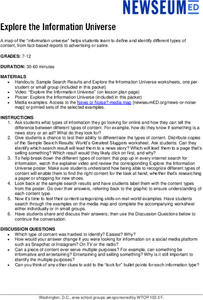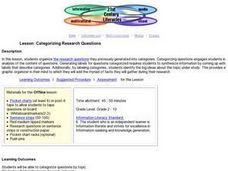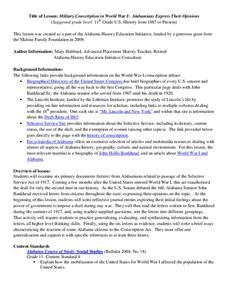EngageNY
Reading and Taking Notes on Colonial Trades
In the tenth instructional activity of this unit, young scholars learn to categorize information as they continue researching their colonial trade. During guided practice, the teacher models how to read informational text slowly while...
Newseum
Explore the Information Universe
Distinguishing among different types of content when conducting online searches can be a challenge. An informative resource helps researchers identify different types of content, from fact-based reports to ads, from propaganda to satire....
Curated OER
Categorizing Research Questions
Show learners of all ages the necessary steps to solid research. Before even looking at a computer screen, they need to generate research questions or topics. They then work together to categorize all of the proposed topics. This process...
Curated OER
Categorizing Objects
Kindergartners practice the important skill of placing things in their correct categories. They must discern between items of clothing and items of food. The use of the Inspiration 7 educational software is effectively used in this...
Polk Bros Foundation
I Can Locate and Classify Information About a Topic
After reading a text, ask your pupils to recall and organize what they've just learned into a blank three-column chart. Class members write the topic and fill in the columns with information. The sheet also prompts students to write a...
EngageNY
Structuring The Search: Categorizing Our Research
What can you contribute? Scholars read text to determine how ants contribute to the rainforest. First, they categorize and sort facts gathered from reading. Next, readers focus on specific terms in each paragraphs of the text Ants by...
EngageNY
Association Between Categorical Variables
Investigate associations between variables with two-way tables. Scholars continue their study of two-way tables and categorical variables in the 15th installment of a 21-part module. The lesson challenges them to calculate relative...
Florida Center for Reading Research
Comprehension: Text Analysis, Persuade, Inform, and Entertain Sort
Why do authors write? Practice determining the author's purpose with a categorizing activity. Learners sort twelve short passages into three categories: persuade, inform, and entertain.
EngageNY
Mid-Unit 2 Assessment: Inferring About the Silversmith Trade in Colonial Times
The seventh lesson plan in this unit on colonial trade assesses fourth graders' ability to use details from an informational text to make inferences and create a piece of informative writing. The included assessment begins with learners...
Curated OER
Organizing Research
Before sending your third graders to the library, help them build a solid foundation for their research with this plan. Following the "I do, we do, you do" method, the teacher starts by modeling how to create a research question and...
Teacher Created Resources
Angelina and Sarah Grimke: Sisters of Social Reform
Who are the Grimke sisters? Scholars find out with a worksheet that details the struggles and triumphs of the lives of Angelina and Sarah Grimke. After reading an informational text, class members have the opportunity to show what they...
Curated OER
All About Our Town
Pupils explore brochure writing. They work in groups to brainstorm and categorize important places in their community. In addition, they gather information from the Internet, take pictures using a digital camera, and create a community...
Curated OER
Identifying Information-The Dogon of Africa
Students practice categorizing information. In this sociology lesson, students categorize information based on a video about the Dogon people of Mali. Students work to separate information into the following categories: missing,...
US Department of Agriculture
Agriculture Counts
Agricultural survey and the documentation of livestock or goods was the basis for the first written language. Youngsters discuss sorting and counting, and how these skills have been used for thousands of years. They accent their class...
Curated OER
Over and Through Information Sheet
Eager earth scientists practice using vocabulary related to landforms and bodies of water. On the first page they categorize the terms and form sentences with them. Then, they test their knowledge with twenty-five multiple-choice...
Curated OER
Count and Noncount Nouns: Categorizing
In this categorizing words worksheet, students fill out a chart in which 12 words are categorized into three columns: food, weather, communication.
Curated OER
Campaign Trailblazers
Explore the backgrounds, qualifications, and platforms of the presidential candidates for the 2000 election. Though the lesson is outdated, the activities within the informational text could be good practice for your young learners as...
Alabama Department of Archives and History
Military Conscription in World War I: Alabamians Express Their Opinions
If called, would you go? Should the US government have the power to impose a draft during any war? The Selective Service Act of 1917 (aka the Conscription Act of 1917) authorized the drafting of men into the military for only the second...
Curated OER
Pebbles, Sand and Silt -- Categorizing Fiction and Informational Books
Primary readers complete the activities in a Pebbles, Sand and Silt FOSS kit. As a class, they are given a group of rocks and they are to categorize them based on their activities in the FOSS kit. They use this information and apply it...
EngageNY
Organizing Evidence from Multiple Informational Texts to Prepare for Writing: What Makes an Earthquake a Natural Disaster?
Fifth graders prepare for their end of the unit essay assessment by continuing to look at what makes an earthquake a natural disaster. They complete a graphic organizer and write a topic sentence. To finish, they view a model essay and...
EngageNY
Taking Notes Using a Graphic Organizer: Inferring About the Importance of Religion in Colonial America
Improve class understanding of colonial times by reading an informational text and filling out the accompanying graphic organizer. Class members work with a partner to read, take notes, make inferences, and synthesize information.The...
Curated OER
Finding Problems In A Story
Students categorize information into a problem/solving chart and examine the value of using a diary. In this problem solving and diary lesson, students read portions of Dear Mr. Henshaw, while they investigate the importance of keeping a...
Curated OER
Creating and Outline From Research
Fourth graders develop 3 research questions about a topic they choose and categorize the information they have learned. In this research lesson plan, 4th graders use a variety of non fiction materials from the library.
Curated OER
School Newspaper
Fifth graders run a school newspaper on a school website and discover how to use various literary forms as they relate to the writing process. In this school newspaper lesson, 5th graders synthesize information from different sources,...

























